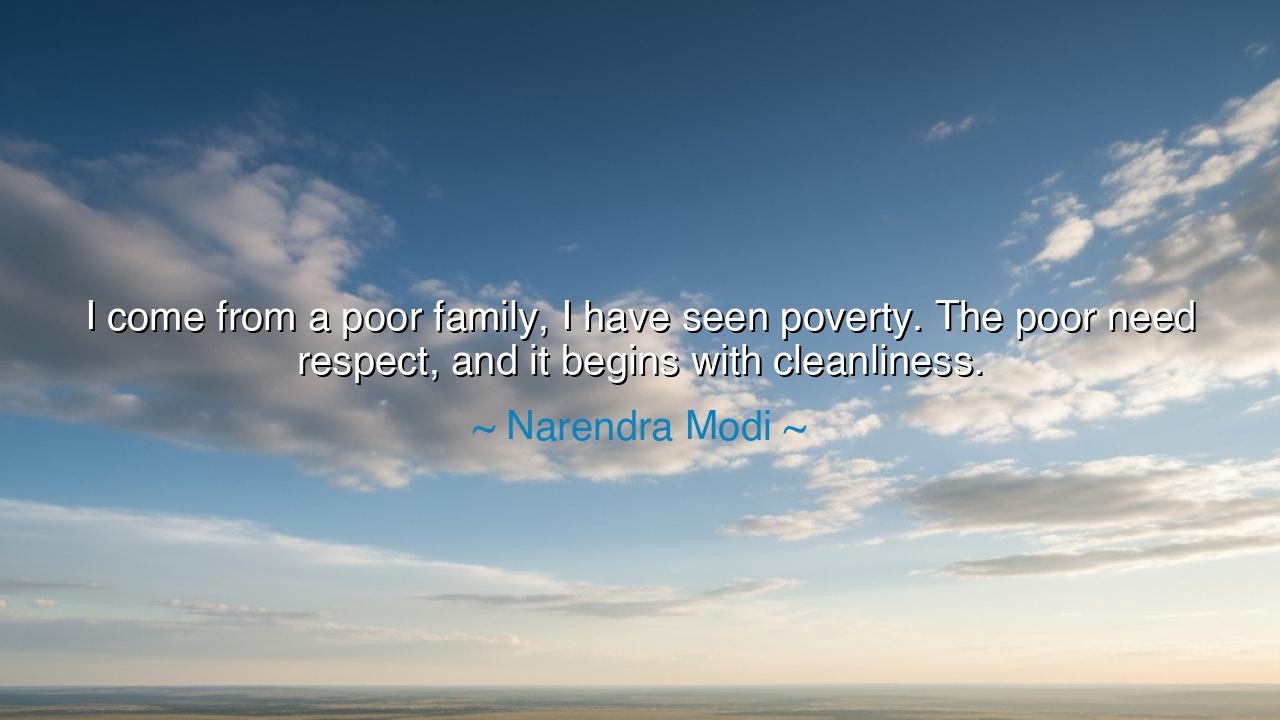
I come from a poor family, I have seen poverty. The poor need
I come from a poor family, I have seen poverty. The poor need respect, and it begins with cleanliness.






Hear the words of Narendra Modi, spoken from the memory of struggle and the fire of lived truth: “I come from a poor family, I have seen poverty. The poor need respect, and it begins with cleanliness.” These words, though plain in form, carry a weight as ancient as civilization itself. For they remind us that dignity is not born of riches or rank, but from the simple, sacred condition of being treated with respect. And that respect, he declares, begins with cleanliness—a foundation upon which the poor may stand with pride before the world.
The ancients too recognized this. In the laws of Moses, it was written that even the stranger, even the laborer, must be treated with honor, and that cleanliness was not mere ritual but a mark of dignity. The Greeks, in their gymnasia and baths, understood that to cleanse the body was also to uplift the spirit. In India, the sages taught that cleanliness is akin to godliness, a discipline that transforms not only the outer world but the inner life. Thus Modi’s words echo a wisdom as old as humanity: that the road to respect begins in how we care for ourselves and for the spaces we dwell in.
Consider the story of Mahatma Gandhi, who walked among the villages of India and declared that freedom was not only political but also social and personal. He spoke tirelessly of sanitation, of latrines, of the need to sweep one’s own street. Many mocked him, saying such matters were too small for a leader. Yet Gandhi saw the truth: that without cleanliness, the poor remained chained in humiliation; with it, they could stand upright, demanding justice with heads unbowed. In this, Modi’s words find their origin—in a lineage of leaders who saw dignity not in gold, but in simplicity.
For poverty is not only the lack of wealth, but the burden of indignity. To be poor and yet clean, to be poor and yet carry oneself with discipline, is to proclaim: “I too am worthy of respect.” Dirt and filth, though born of neglect and oppression, are too often seen as the mark of character, when they are only the mark of circumstance. By beginning with cleanliness, one begins to restore the poor man’s rightful honor, affirming that his humanity is no less sacred than that of the rich.
The meaning of Modi’s words is not merely about hygiene, but about transformation. When the poor find the means and the will to maintain cleanliness, they shatter the image of helplessness imposed upon them. And when society invests in the cleanliness of its streets, its schools, its villages, it proclaims that it honors every citizen, no matter how humble. In this way, cleanliness becomes not just physical, but social—a revolution of dignity.
The lesson for us all is urgent: if we would uplift the poor, let us begin not with pity, but with respect. And let that respect show itself in action—by ensuring clean water, clean streets, clean dwellings, and by honoring the poor as fellow bearers of human dignity. To mock the poor for filth is cruelty; to empower them with cleanliness is justice. For in giving cleanliness, we give far more—we give them the right to hold their heads high.
What, then, shall we do? Let each of us take responsibility, however small, for the cleanliness of our homes, our neighborhoods, our communities. Let us teach children that sweeping the street is no shame, but a noble act of service. Let us remember that when we create environments of cleanliness, we create environments where respect may flourish. In this, we honor not only the poor but also the spirit of humanity itself.
Therefore, O listener, engrave this truth upon your heart: “The poor need respect, and it begins with cleanliness.” For respect is the seed from which dignity grows, and cleanliness is the soil in which that seed first takes root. Honor this, and you will not only uplift the poor—you will uplift the world.






AAdministratorAdministrator
Welcome, honored guests. Please leave a comment, we will respond soon